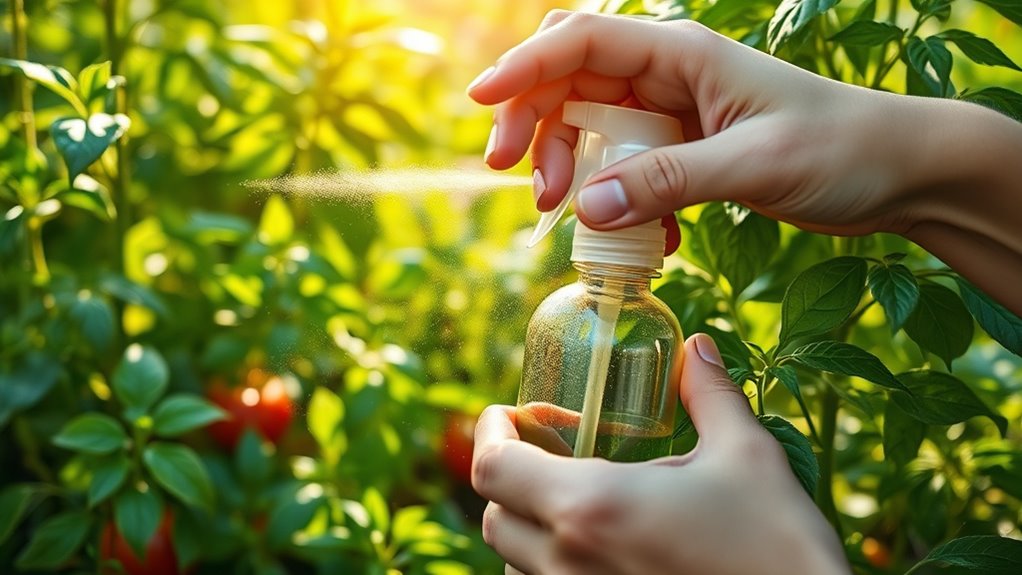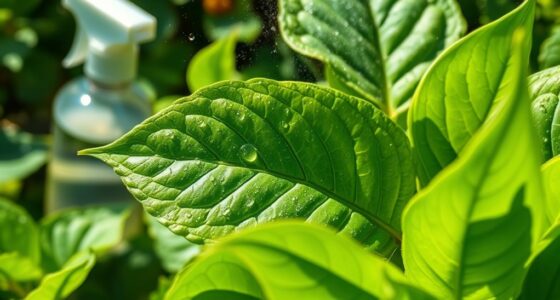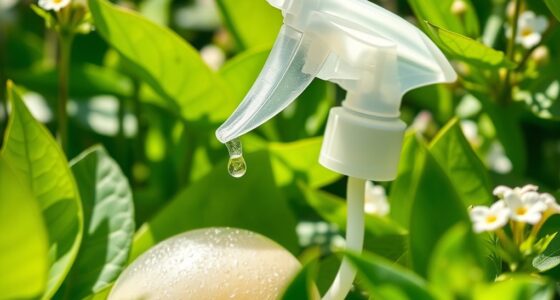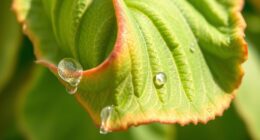To safely use neem oil on your plants, mix it with water and a small amount of mild liquid soap as an emulsifier, following the manufacturer’s instructions. Apply during cooler parts of the day, like early morning or late afternoon, to prevent leaf burn, and make sure to cover all plant surfaces, including undersides of leaves. Repeat every 7 to 14 days as needed. Keep exploring to discover more tips for effective and safe neem oil use.
Key Takeaways
- Mix neem oil with water and a mild liquid soap, following manufacturer’s instructions for safe, effective application.
- Apply during cooler times like early morning or late afternoon to prevent leaf burn.
- Ensure thorough coverage of all plant surfaces, including undersides of leaves.
- Reapply every 7 to 14 days or as needed, adjusting based on pest severity and weather.
- Use carefully during flowering to protect pollinators and avoid harming beneficial insects.
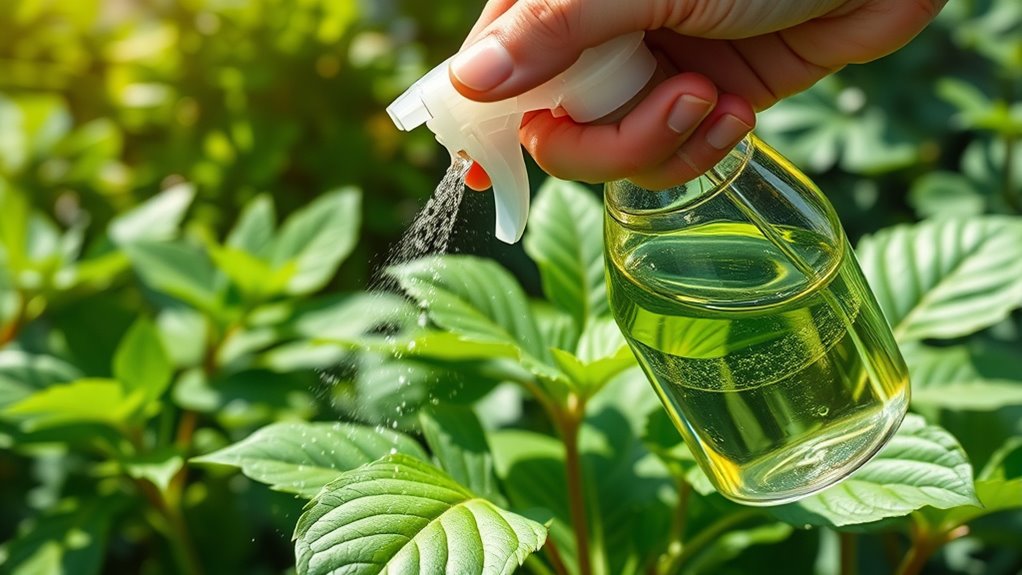
Have you ever wondered how a natural oil can revolutionize your gardening and pest control routines? Neem oil is a powerful tool that fits perfectly into your efforts toward natural pest control and organic gardening. Derived from the seeds of the neem tree, this oil offers a safe, eco-friendly alternative to chemical pesticides. When used correctly, neem oil helps you keep pests at bay without harming beneficial insects or polluting your soil. It’s especially popular among gardeners who want to maintain a healthy, sustainable environment while protecting their plants from common pests like aphids, whiteflies, and spider mites.
Discover how neem oil offers a safe, eco-friendly solution for natural pest control and organic gardening success.
Using neem oil is straightforward, but knowing how to apply it properly makes all the difference. Start by mixing it with water and a small amount of mild liquid soap, which acts as an emulsifier, helping the oil blend evenly. Always follow the manufacturer’s instructions regarding dilution rates—using too much can damage your plants, while too little might be ineffective. It’s best to apply neem oil during the cooler parts of the day, such as early morning or late afternoon, to prevent leaf burn and ensure better absorption. When spraying, cover all surfaces of your plants, including the undersides of leaves where pests often hide.
One of the key advantages of neem oil is its dual action. It doesn’t just repel pests; it also interferes with their feeding and reproductive cycles. When pests ingest or come into contact with neem-treated plants, they often stop feeding and may even die off over time. This makes neem oil an excellent choice for organic gardening, as it targets pests without leaving harmful residues or threatening your beneficial insects like bees and ladybugs. However, it’s essential to apply neem oil with care, especially during flowering, to prevent accidental harm to pollinators.
You should also keep in mind that neem oil isn’t a one-time fix. For ongoing pest issues, repeat applications every seven to 14 days, depending on the severity of the infestation and weather conditions. Always test a small area first to check for any adverse reactions, especially on sensitive plants. When used properly, neem oil becomes a reliable, natural solution that enhances your organic gardening efforts. It’s safe, effective, and aligns perfectly with your goal of cultivating a healthy, vibrant garden without resorting to harsh chemicals. By integrating neem oil into your routine, you’re taking a smart step toward sustainable gardening that’s good for your plants and the environment. Understanding the benefits of natural pest control can help you make more informed choices for your garden’s health.
Frequently Asked Questions
Can Neem Oil Be Used on Edible Plants Safely?
You can use neem oil on edible plants safely if you follow proper guidelines. Make certain the neem oil you choose is labeled for edible plant safety, and apply it during early morning or late evening to minimize neem oil residue on the plants. Always wash your produce thoroughly before consumption to reduce potential residue. When used correctly, neem oil provides an effective, natural pest control method without compromising your edible plants’ safety.
How Often Should I Apply Neem Oil for Pest Control?
You should follow the recommended frequency guidelines for neem oil to effectively control pests without harming your plants. Typically, apply neem oil every 7 to 14 days, depending on the severity of the infestation. Your application schedule may vary based on weather conditions and plant type. Always monitor your plants and adjust the frequency as needed, ensuring you don’t over-apply, which can cause damage.
Is Neem Oil Safe for Pollinators Like Bees?
Imagine you’re a modern gardener in a world full of bees. You wonder if neem oil is safe for pollinator safety and bee health. Generally, neem oil is considered safe when used correctly, but it can harm bees if applied during bloom or in direct contact. To protect pollinators, apply neem oil early in the morning or late in the evening when bees aren’t active, ensuring your garden remains a safe haven.
Can Neem Oil Harm Beneficial Insects?
You might wonder if neem oil harms beneficial insects. While neem oil can have some toxicity, it primarily affects pests when applied directly or in high concentrations. To protect beneficial insect interactions, avoid spraying during peak pollinator activity and use neem oil sparingly. Proper application minimizes neem oil toxicity, ensuring your plants stay healthy without disrupting helpful insects. Always follow label instructions for safe, effective use.
What Is the Best Time of Day to Apply Neem Oil?
You should aim for the ideal timing to apply neem oil early morning, when temperatures are cooler and sunlight is less intense. This helps prevent leaf burn and allows the oil to work effectively. Applying at this time also minimizes harm to beneficial insects, which are usually less active during early morning hours. Consistent early morning applications ensure your plants stay protected without disrupting their natural ecosystem.
Conclusion
By following these simple precautions, neem oil becomes a gentle guardian for your plants, like a trusted shield amidst a battlefield. When used correctly, it’s a powerful tool that keeps pests at bay without harming your greenery. Remember, patience and moderation are your best allies. With neem oil as your ally, you’ll nurture a thriving, healthy garden, where your plants dance in harmony—protected, vibrant, and resilient against unwanted invaders.
